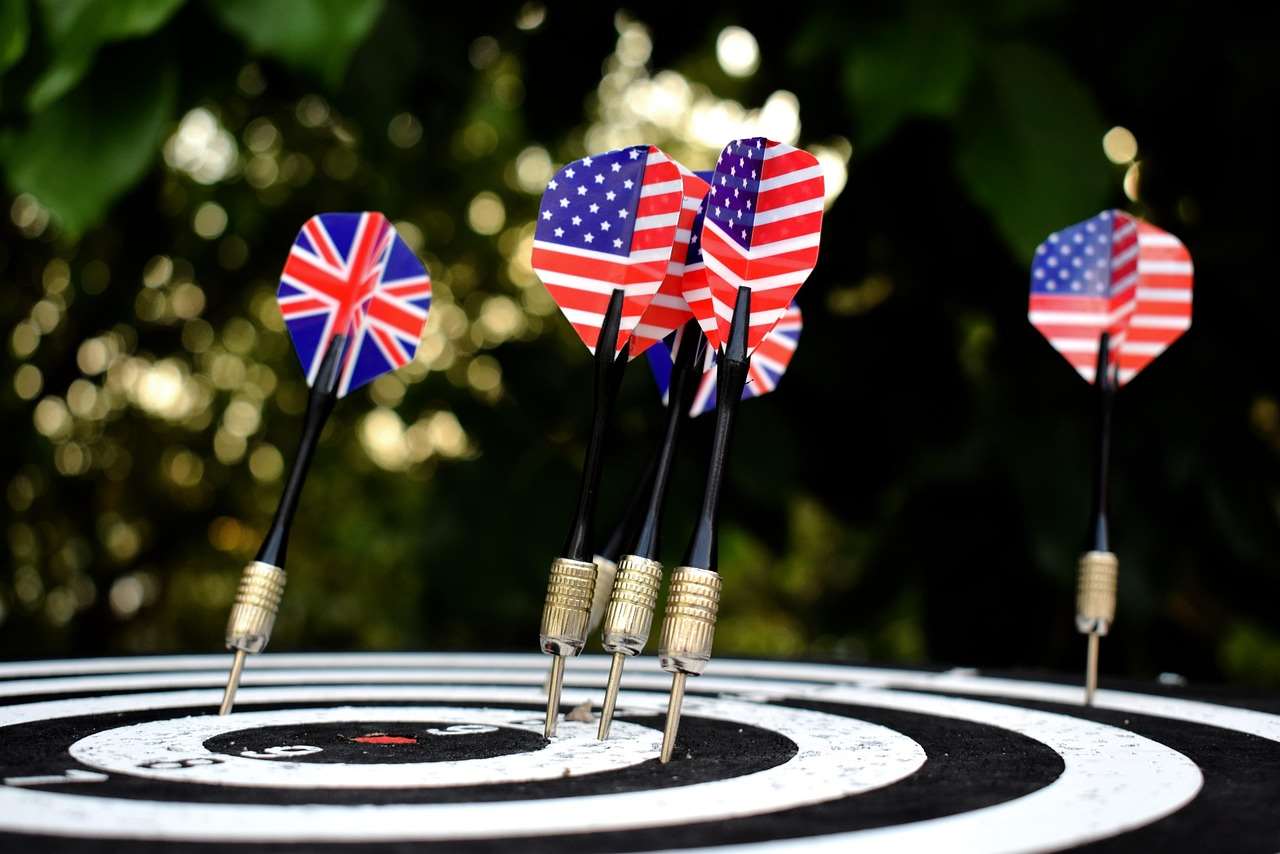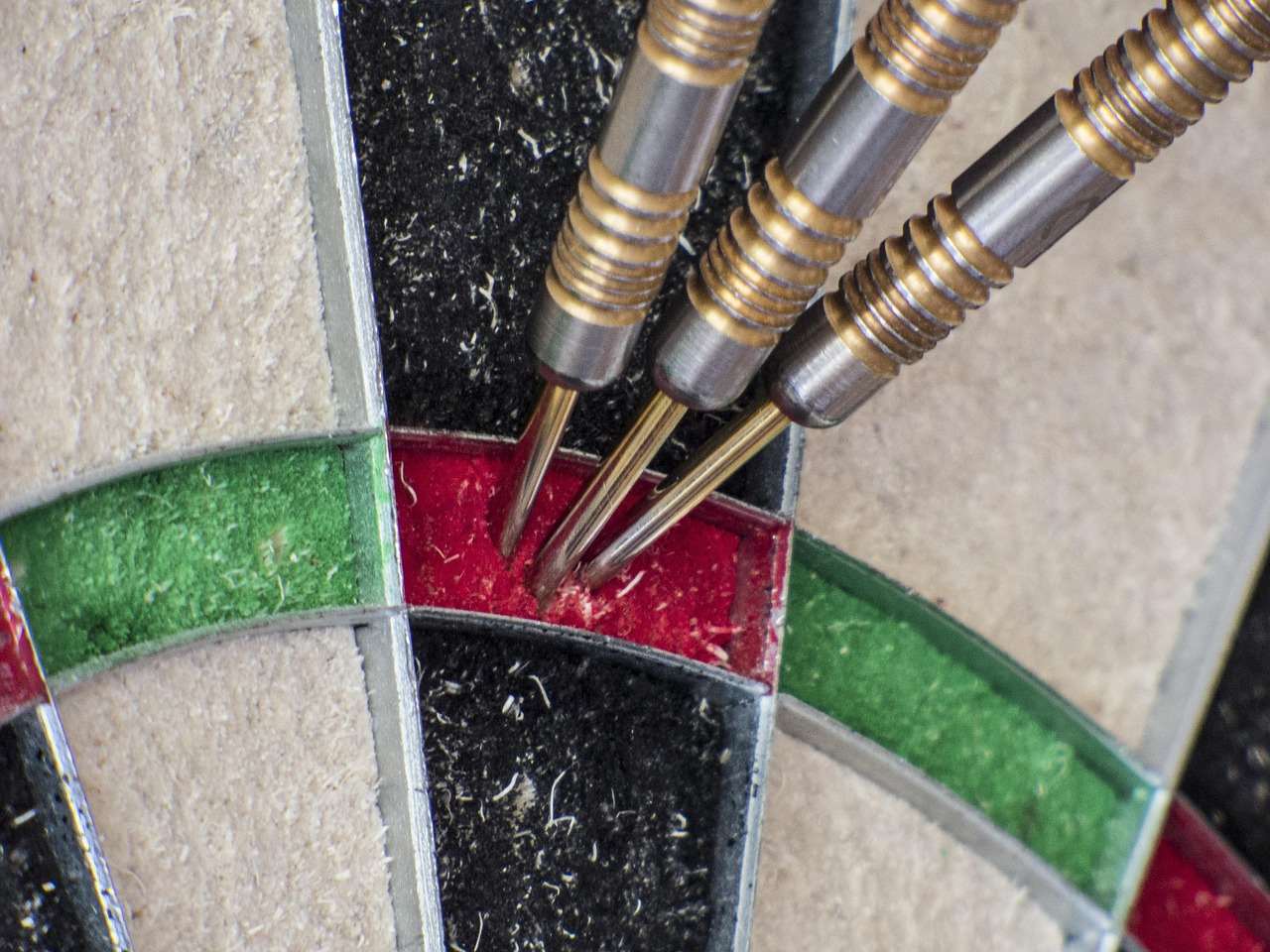In darts, what’s the bull worth in darts? The outer bullseye, often called just the ‘bull’, is worth 25 points, while the inner bullseye, known as the ‘double bull’ or ‘bullseye’, scores 50 points. This article will delve into the strategic importance of the bullseye, exploring how it impacts gameplay, scoring tactics, and the overall excitement of the game.
⚠️ Still Using Pen & Paper (or a Chalkboard)?! ⚠️
Step into the future! The Dart Counter App handles all the scoring, suggests checkouts, and tracks your stats automatically. It's easier than you think!
Try the Smart Dart Counter App FREE!Ready for an upgrade? Click above!
Understanding the Bullseye: What’s the Bull Worth in Darts and Why It Matters
The bullseye, that small, circular target at the heart of the dartboard, holds a pivotal role in darts. Beyond simply being a high-scoring area, it’s a strategic focal point that influences every aspect of the game. Knowing what’s the bull worth in darts (25 for the outer, 50 for the inner) is just the beginning; understanding its strategic significance is key to improving your game.

The Two Bullseyes: Outer vs. Inner
Let’s clarify the bullseye further:
- Outer Bull (Single Bull): This is the larger, green ring surrounding the inner bullseye. It’s worth 25 points.
- Inner Bull (Double Bull/Bullseye): This is the smaller, red center circle. It’s worth 50 points and is often simply referred to as the “bullseye.”
This distinction is crucial, especially in games like 501 where hitting the double bull is often the only way to finish a leg.
Strategic Importance of the Bullseye
The bullseye offers significant strategic advantages in various game scenarios. Mastering shots at the bull can greatly enhance your chances of winning.
Finishing on the Bull
In games like 501, the double bull is a popular and efficient way to finish, especially when you have a score of 50 remaining. It allows you to end the leg with a single, well-aimed dart. Practicing this shot is invaluable. You can even use an electronic darts scoreboard for sale to help improve your game.
Setting Up Future Scores
Even if you can’t finish directly on the bullseye, hitting it can position you for easier finishes on subsequent throws. For example, if you need 80 to finish and you hit the outer bull, you’ll be left with 55, which can then be finished with a single 15 and a double top (20).
Cricket Strategies
In Cricket, the bullseye counts as both a 25 and a double. This makes it a valuable target for closing out numbers or scoring points quickly. Consider the strategic importance of the bull when playing Cricket, especially when contesting key numbers with your opponent.

How to Improve Your Bullseye Accuracy
Consistently hitting the bullseye requires practice, technique, and the right equipment. Here are some tips to help you improve your accuracy:
Stance and Grip
Your stance and grip are fundamental to accuracy. Experiment with different stances to find one that feels comfortable and stable. A consistent grip is also crucial; avoid gripping the dart too tightly, as this can cause tension and affect your throw. If your darts are constantly bouncing out, maybe it is time for a new steel dart.
Throwing Motion
Develop a smooth and controlled throwing motion. Avoid jerky movements and focus on releasing the dart at the right moment. Practice your follow-through; a consistent follow-through helps ensure the dart travels in the intended direction.
Targeting and Aiming
When aiming for the bullseye, visualize the target and focus your eyes on it. Some players find it helpful to use a specific aiming point on the dartboard. Experiment to see what works best for you.
Practice Drills
Incorporate specific practice drills into your routine to improve your bullseye accuracy. Here are a few examples:
- The “Bullseye Only” Drill: Focus solely on hitting the bullseye for a set period of time.
- The “Around the Clock” Drill: Start at 1 and work your way around the board, hitting each number and then finishing on the bullseye.
- The “Double Out” Drill: Practice finishing on doubles, including the double bull, to improve your finishing skills.
Equipment Considerations
The type of darts you use can also affect your accuracy. Experiment with different weights, shapes, and materials to find darts that suit your throwing style. Also, make sure your dartboard is in good condition and properly mounted at the correct height. You can even try the double shock dart.

What’s the Bull Worth in Darts? Beyond the Numbers: Psychological Aspects
While the numerical value of the bullseye is important, its psychological impact on players can be just as significant. Successfully hitting the bullseye can boost your confidence and put pressure on your opponent.
Building Confidence
Consistently hitting the bullseye builds confidence in your abilities. This confidence can translate to improved performance in other areas of the game.
Applying Pressure
Hitting the bullseye at critical moments can apply pressure to your opponent. It shows them that you are capable of making high-pressure shots, which can cause them to make mistakes.
Mental Toughness
Darts is as much a mental game as it is a physical one. Developing mental toughness and the ability to stay focused under pressure are essential for success. Practicing bullseye shots in high-pressure situations can help you develop these skills.

Advanced Bullseye Strategies
Once you’ve mastered the basics, you can explore more advanced strategies involving the bullseye.
Using the Bull for Setups
As mentioned earlier, the bull can be used to set up future scores. For example, if you need 82 to finish, hitting the bullseye leaves you with 32, which can be finished with a double 16.
Strategic Variations in Cricket
In Cricket, you might choose to hit the single bull (25) to close out a number more quickly, or you might go for the double bull (50) to score more points and put pressure on your opponent. The choice depends on the specific situation and your overall game plan. It is important to understand the scores in the darts if you plan to use such strategy.
Reading Your Opponent
Pay attention to your opponent’s tendencies when it comes to the bullseye. Do they tend to go for it in certain situations? Do they struggle with pressure shots? Understanding your opponent’s strengths and weaknesses can help you make better strategic decisions. If you are having trouble keeping score, you could try Cricket darts scorer app (https://dartcounterapp.com/).

Conclusion: Mastering the Bullseye
Understanding what’s the bull worth in darts is fundamental, but truly mastering the bullseye requires consistent practice, strategic thinking, and mental fortitude. From finishing legs to setting up future scores and applying psychological pressure, the bullseye plays a crucial role in darts strategy. By incorporating the tips and strategies outlined in this article, you can improve your accuracy, boost your confidence, and take your game to the next level. Now get out there, practice, and start hitting those bullseyes! Are you using the cheap darts scoring system?
Hi, I’m Dieter, and I created Dartcounter (Dartcounterapp.com). My motivation wasn’t being a darts expert – quite the opposite! When I first started playing, I loved the game but found keeping accurate scores and tracking stats difficult and distracting.
I figured I couldn’t be the only one struggling with this. So, I decided to build a solution: an easy-to-use application that everyone, no matter their experience level, could use to manage scoring effortlessly.
My goal for Dartcounter was simple: let the app handle the numbers – the scoring, the averages, the stats, even checkout suggestions – so players could focus purely on their throw and enjoying the game. It began as a way to solve my own beginner’s problem, and I’m thrilled it has grown into a helpful tool for the wider darts community.